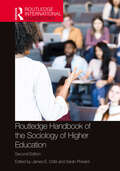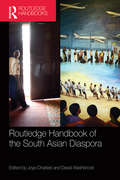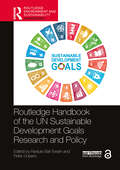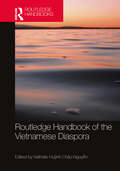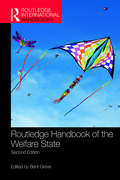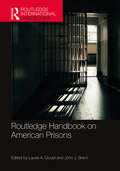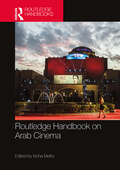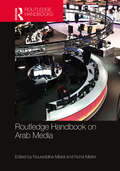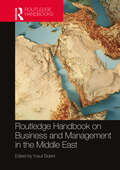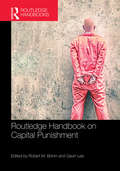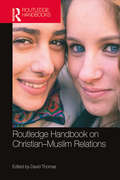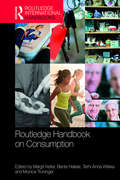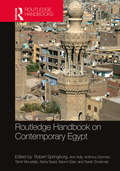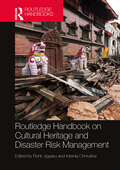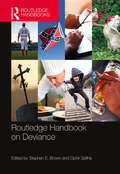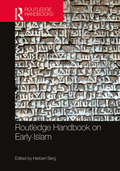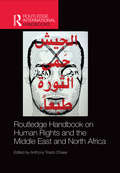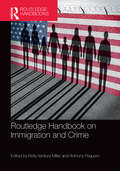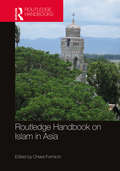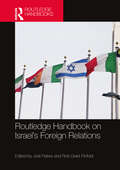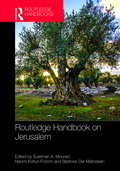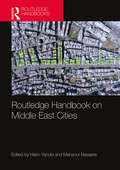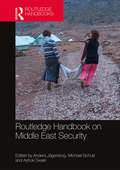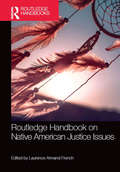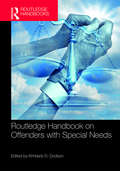- Table View
- List View
Routledge Handbook of the Sociology of Higher Education (Routledge International Handbooks)
by James E. Côté Sarah PickardHigher education has come under increasing public scrutiny in recent years, assailed with demands for greater efficiency, accountability, cost reduction, and, above all, job training. Drawing upon examples from across the world, with an emphasis on Anglo-American higher-education systems, this handbook employs sociological approaches to address these pressing concerns. The second edition is thoroughly updated and adds several new chapters to shed further light on the transformations wrought by the interrelated processes of massification, vocationalization, and marketization that have swept through universities in the wake of neoliberal reforms introduced by governments since the 1980s. The handbook explores recent developments in higher-education systems and policy as well as the everyday experiences of students and staff and ongoing problems of inequality and diversity within universities. In doing so, the chapters address a number of current issues concerning the legitimacy of higher-educational credentials, from the continuing debate regarding traditional pedagogies and the role of universities in social class reproduction to more recent concerns about standards in mass systems. Collectively, this handbook demonstrates that the sociology of higher education has the potential to play a leadership role in improving the myriad higher-education systems around the world that are now part of an interrelated set of subsystems, replete with both persistent problems and promising prospects. This book is therefore necessary reading for a variety of stakeholders within academia as well as professionals and policy-makers interested in understanding higher education and the acute challenges it faces.
Routledge Handbook of the South Asian Diaspora
by Joya Chatterji David WashbrookSouth Asia’s diaspora is among the world’s largest and most widespread, and it is growing exponentially. It is estimated that over 25 million persons of Indian descent live abroad; and many more millions have roots in other countries of the subcontinent, in Pakistan, Bangladesh and Sri Lanka. There are 3 million South Asians in the UK and approximately the same number resides in North America. South Asians are an extremely significant presence in Southeast Asia and Africa, and increasingly visible in the Middle East. This inter-disciplinary handbook on the South Asian diaspora brings together contributions by leading scholars and rising stars on different aspects of its history, anthropology and geography, as well as its contemporary political and socio-cultural implications. The Handbook is split into five main sections, with chapters looking at mobile South Asians in the early modern world before moving on to discuss diaspora in relation to empire, nation, nation state and the neighbourhood, and globalisation and culture. Contributors highlight how South Asian diaspora has influenced politics, business, labour, marriage, family and culture. This much needed and pioneering venture provides an invaluable reference work for students, scholars and policy makers interested in South Asian Studies.
Routledge Handbook of the UN Sustainable Development Goals Research and Policy (Routledge Environment and Sustainability Handbooks)
by Ranjula Bali Swain Peter DobersThis handbook brings together a collection of seminal research on the Sustainable Development Goals (SDGs) and investigates the effectiveness of the 17 goals for achieving transformative change toward sustainable development. As a collection of inter- and transdisciplinary research from around the world, this volume explores the applications, implications, and best practices of the goals at thematic, regional, and national levels, providing specific examples from a diverse range of places, such as Australia, Brazil, China, DRC, India, Italy, the Sahel region of Africa, and the USA, among others. The book serves as a mid-term evaluation of the SDGs, bringing to the fore comprehensive experiences and evidence related to the SDGs, whilst highlighting the interlinkages between the different goals. The handbook is divided into two parts: Part I brings together groundbreaking research to define, identify, and present conceptual frameworks for a sustainable future, whilst Part II focuses on the policies, practices, and implementation of the SDGs. The chapters identify key aspects missing from the 2030 Agenda, such as global power imbalances, cultural diversity, Indigenous rights, and unsustainable levels of consumption; they also critically evaluate the overall delivery and effectiveness of the SDGs whilst outlining potential future directions for the post-SDG 2030 Agenda. This handbook is aimed at a diverse and global audience of academics and students of economics, business studies, political science, and development studies. It will also serve as a valuable reference for leaders in the industry, the public sector, civil society, and international policymakers keen to gain a better understanding of the SDGs.
Routledge Handbook of the Vietnamese Diaspora
by Nathalie Huỳnh Châu NguyễnThe Routledge Handbook of the Vietnamese Diaspora presents a comprehensive overview and analysis of Vietnamese migrations and diasporas, including the post-1975 diaspora, one of the most significant and highly visible diasporas of the late twentieth century.This handbook delves into the processes of Vietnamese migration and highlights the variety of Vietnamese diasporic journeys, trajectories and communities as well as the richness and depth of Vietnamese diasporic literary and cultural production. The contributions across the fields of history, anthropology, sociology, literary studies, film studies and cultural studies point to the diversity of approaches relating to scholarship on Vietnamese diasporas.The handbook is structured in five parts: Colonial legacies Refugees, histories and communities Migrant workers, international students and mobilities Literary and cultural production Diasporas and negotiations Offering multiple cutting-edge interpretations, representations and reconstructions of diaspora and the diasporic experience, this first reference work of the Vietnamese diaspora will be an invaluable tool for students and researchers in the fields of Asian Studies, Asian American Studies, Ethnic Studies, Refugee Studies, Transnational Studies and Migration and Diaspora Studies.
Routledge Handbook of the Welfare State (Routledge International Handbooks)
by Bent GreveForty-five contributions from renowned international specialists in the field provide readers with expert analysis of the core issues related to the welfare state, including regional depictions of welfare states around the globe. The second edition of the Routledge Handbook of the Welfare State combines essays on methodologies, core concepts and central policy areas to produce a comprehensive understanding of what ‘the welfare state’ means around the world. In the aftermath of the credit crunch, the Handbook addresses some of the many questions about the welfare state. This second edition has been thoroughly revised and updated to include an in-depth analysis of societal changes in recent years. New articles can be found on topics such as: the impact of ideas, well-being, migration, globalisation, India, welfare typologies, homelessness and long-term care. This volume will be an invaluable reference book for students and scholars throughout the social sciences, particularly in sociology, social policy, public policy, international relations, politics and gender studies.
Routledge Handbook on American Prisons (Routledge International Handbooks)
by Laurie A. GouldThe Routledge Handbook on American Prisons is an authoritative volume that provides an overview of the state of U.S. prisons and synthesizes the research on the many facets of the prison system. The United States is exceptional in its use of incarceration as punishment. It not only has the largest prison population in the world, but also the highest per-capita incarceration rate. Research and debate about mass incarceration continues to grow, with mounting bipartisan agreement on the need for criminal justice reform. Divided into four sections (Prisons: Security, Operations and Administration; Types of Offenders and Populations; Living and Dying in Prison; and Release, Reentry, and Reform), the volume explores the key issues fundamental to understanding the U.S. prison system, including the characteristics of facilities; inmate risk assessment and classification, prison administration and employment, for-profit prisons, special populations, overcrowding, prison health care, prison violence, the special circumstances of death row prisoners, collateral consequences of incarceration, prison programming, and parole. The final section examines reform efforts and ideas, and offers suggestions for future research and attention. With contributions from leading correctional scholars, this book is a valuable resource for scholars with an interest in U.S. prisons and the issues surrounding them. It is structured to serve scholars and graduate students studying corrections, penology, institutional corrections, and other related topics.
Routledge Handbook on Arab Cinema
by Noha MellorBuilding on a growing body of literature, this Handbook provides an up-to-date and authoritative survey of Arab cinema.The collection includes contributions from academics and filmmakers from across the Arab region, Europe, and North America, and fills a gap in media studies by examining the entire Arab region, rather than focusing on one country or theme. The Handbook also sheds light on the heterogeneity of Arab filmmaking not only within the Arab region, but also globally, within diasporic communities. It is split into six parts: Part 1 provides an overview of each sub-region in the Arab world, including a chapter on Arab animation films. Parts 2, 3, and 4 address topical themes, encompassing the representation of gender, religion, and identity politics in Arab cinema. Part 5 discusses the theme of diaspora and Part 6 concludes the volume with reflective essays penned by selected diasporic filmmakers. This book is an essential reference for Arab media and cinema scholars, students, and professional filmmakers. With case studies from across the Arab region, it's also a valuable resource for anyone interested in film and media, global cinema, and the Middle East generally.
Routledge Handbook on Arab Media
by Noha Mellor Noureddine MiladiThis handbook provides the first comprehensive reference book in English about the development of mass and social media in all Arab countries. Capturing the historical as well as current developments in the media scene, this collection maps the role of media in social and political movements. Contributors include specialists in the field from North America, Europe, and the Middle East. Each chapter provides an overview of the history, regulatory frameworks and laws governing the press, and socio-political functions of the media. While the geopolitical complexities of the region have been reflected in the expert analyses collectively, the focus is always the local context of each member state. All 38 chapters consider the specific historical, political, and media trajectories in each country, to provide a contextual background and foundation for further study about single states or comparative analysis in two or more Arab states. Capturing significant technological developments and the widespread use of social media, this all-inclusive volume on Arab media is a key resource for students and scholars interested in journalism, media, and Middle East studies.
Routledge Handbook on Business and Management in the Middle East
by Yusuf SidaniThis Handbook provides thorough insights into crucial topics that have attracted scholarly and practitioner interest in business and management in the Middle Eastern region.The chapters of this Handbook open the window on the key areas of discussion in the field over the past few decades, including organizational behavior, leadership, business culture, business ethics, human resources, business strategy, entrepreneurship, finance, and accounting. It starts with identifying five key themes emerging from the variety of topics, locations, and questions addressed by the various authors who contributed to this volume. The remaining 30 chapters tackle various topics of interest to the research and the practitioner: institutional contexts for doing business in the region; issues of leadership, ethics, and organizational behavior; the role of women in leadership and some of the obstacles facing aspirant women leaders; people management and human resources issues in the Middle East; marketing in the Middle East; and strategy and entrepreneurship in the Middle East. The book closes with a reflection on management research in non-Western societies and describes some methodological challenges and propositions.The Handbook is designed for academics, students, and practitioners covering areas of relevance across business activities, functions, and locations in the Middle East. It is to be used as a reference for scholars doing business research or teaching and for practitioners involved in business activities in the region.
Routledge Handbook on Capital Punishment (Routledge International Handbooks)
by Robert M. Bohm Gavin LeeCapital punishment is one of the more controversial subjects in the social sciences, especially in criminal justice and criminology. Over the last decade or so, the United States has experienced a significant decline in the number of death sentences and executions. Since 2007, eight states have abolished capital punishment, bringing the total number of states without the death penalty to 19, plus the District of Columbia, and more are likely to follow suit in the near future (Nebraska reinstated its death penalty in 2016). Worldwide, 70 percent of countries have abolished capital punishment in law or in practice. The current trend suggests the eventual demise of capital punishment in all but a few recalcitrant states and countries. Within this context, a fresh look at capital punishment in the United States and worldwide is warranted. The Routledge Handbook on Capital Punishment comprehensively examines the topic of capital punishment from a wide variety of perspectives. A thoughtful introductory chapter from experts Bohm and Lee presents a contextual framework for the subject matter, and chapters present state-of-the-art analyses of a range of aspects of capital punishment, grouped into five sections: (1) Capital Punishment: History, Opinion, and Culture; (2) Capital Punishment: Rationales and Religious Views; (3) Capital Punishment and Constitutional Issues; (4) The Death Penalty’s Administration; and (5) The Death Penalty’s Consequences. This is a key collection for students taking courses in prisons, penology, criminal justice, criminology, and related subjects, and is also an essential reference for academics and practitioners working in prison service or in related agencies.
Routledge Handbook on Christian-Muslim Relations
by David ThomasThe matter of Christian–Muslim relations cannot be ignored these days. While the term itself may not appear all that often, relations between the two faiths and their reciprocal perceptions are undeniable influences behind many current conflicts, declarations of mutual recognition and peace negotiations, not to mention the brooding hatred of religious extremists. Since 9/11, relations between the two faiths have, in one form or another, hardly been away from the news. This Handbook contains fundamental information about the major aspects of relations between Christians and Muslims. Its various sections follow the history from the early seventh century to the present, the major religious issues that have led to disputes between the two faiths, and the political implications of religious differences at various stages through history, as well as in the present. It includes analysis of scriptural and theological themes and explores the characteristics of relations at important points in history and also in various parts of the world today. Chapters are devoted to the most significant intellectual interpretations and encounters, the main armed clashes, including the Crusades, and the important documents issued by each faith that in recent years have led the way towards new developments in recognition and acceptance. With chapters written by some of the foremost experts in the field, the book traces the largely dark history of relations and explains the underlying reasons why Muslims and Christians have found tolerance and respect for the other difficult. It is an excellent resource for understanding the past and for highlighting lessons for future relations between the world’s two largest religions.
Routledge Handbook on Consumption (Routledge International Handbooks)
by Bente Halkier Margit Keller Monica Truninger Terhi-Anna WilskaConsumption research is burgeoning across a wide range of disciplines. The Routledge Handbook on Consumption gathers experts from around the world to provide a nuanced overview of the latest scholarship in this expanding field. At once ambitious and timely, the volume provides an ideal map for those looking to position their work, find new analytic insights and identify research gaps. With an intuitive thematic structure and resolutely international outlook, it engages with theory and methodology; markets and businesses; policies, politics and the state; and culture and everyday life. It will be essential reading for students and scholars across the social and economic sciences.
Routledge Handbook on Contemporary Egypt
by Robert SpringborgInvestigating key features of contemporary Egypt, this volume includes Egypt’s modern history, politics, economics, the legal system, environment, and its media and modes of cultural expression. It examines Egypt’s capacities to meet developmental challenges, ranging from responding to globalization and regional competition to generating sufficient economic growth and political inclusion to accommodate the interests and demands of a rapidly growing population. The macrohistory of Egypt is complemented by the microhistories of specific institutions and processes that constitute separate sections in this handbook. The chapters revolve around political economy: it is shaped by the people and their abilities, political and legal institutions, organization of the economy, natural and built environments, and culture and communication. Politics has been overwhelmingly authoritarian and coercive since the military seized power in 1952; consequently, the contributions address both the causes and consequences of unbalanced civil–military relations, military rule, and persisting authoritarianism in the political society. This multidisciplinary handbook serves a dual purpose of introducing readers to Egypt’s history and contemporary political economy and as a comprehensive key resource for postgraduate students and academics interested in modern Egypt.
Routledge Handbook on Cultural Heritage and Disaster Risk Management
by Ksenia Chmutina Rohit JigyasuThis Handbook provides a comprehensive and interdisciplinary overview of the intersections between cultural heritage and disaster risks. It serves as a defining reference, presenting the key concepts and policy arena that disaster risk management and cultural heritage currently operate. With 22 contributions from leading scholars and practitioners in the field, chapters explore the various contexts for cultural heritage and disaster risk management, illustrated through case studies from around the world. The Handbook is organised into 4 parts: Part 1 includes Disaster Risk Management and Cultural Heritage, Part 2 helps to Understanding the context, Part 3 focuses on the challenges and Part 4 delves deep into the future prospects. This Handbook provides insights a wide range of topics and themes, such as climate change, conflict, urbanisation, the role of community, and examines the relationships with a range of sectors such as governance and policy, finance, infrastructure, shelter, and urban planning. It also presents critiques on issues that are often taken for granted, including technocratic approaches, nature/culture binary, the romanticisation of traditional knowledges and the role of recovery and reconstruction. Insights into the future are also presented, and the Handbook concludes with a detailed agenda of proposed action to be taken in the field. Offering critical reflections on the topic, this book caters to students, researchers, professionals, and policy makers in the fields of disaster studies, cultural studies, heritage studies, conservation and geography.
Routledge Handbook on Deviance (Routledge International Handbooks)
by Stephen E. Brown Ophir SefihaThe Routledge Handbook on Deviance brings together original contributions on deviance, with a focus on new, emerging, and hidden forms of deviant behavior. The editors have curated a comprehensive collection highlighting the relativity of deviance, with chapters exploring the deviant behaviors related to sport, recreation, body modification, chronic health conditions, substance use, religion and cults, political extremism, sexuality, online interaction, mental and emotional disorders, elite societal status, workplace issues, and lifestyle. The selections review competing definitions and orientations and a wide range of theoretical premises while addressing methodological issues involved in the study of deviance. Each section begins with an introduction by the editors, anchoring the topics in relevant theoretical and methodological contexts and identifying common themes as well as divergence. Providing state-of-the-art scholarship on deviance in modern society, this handbook is an invaluable resource for researchers and students engaged in the study of deviance across a range of disciplines including criminology, criminal justice, sociology, anthropology, and interdisciplinary departments, including justice studies, social transformation, and socio-legal studies.
Routledge Handbook on Early Islam
by Herbert BergThe formative period of Islam remains highly contested. From the beginning of modern scholarship on this formative period, scholars have questioned traditional Muslim accounts on early Islam. The scholarly fixation is mirrored by sectarian groups and movements within Islam, most of which trace their origins to this period. Moreover, contemporary movements from Salafists to modernists continue to point to Islam’s origins to justify their positions. This Handbook provides a definitive overview of early Islam and how this period was understood and deployed by later Muslims. It is split into four main parts, the first of which explores the debates and positions on the critical texts and figures of early Islam. The second part turns to the communities that identified their origins with the Qurʾān and Muḥammad. In addition to the development of Muslim identities and polities, of particular focus is the relationship with groups outside or movements inside of the umma (the collective community of Muslims). The third part looks beyond what happened from the 7th to the 9th centuries CE and explores what that period, the events, figures, and texts have meant for Muslims in the past and what they mean for Muslims today. Not all Muslims or scholars are willing to merely reinterpret early Islam and its sources, though; some are willing to jettison parts, or even all, of the edifice that has been constructed over almost a millennium and a half. The Handbook therefore concludes with discussions of re-imaginations and revisions of early Islam and its sources. Almost every major debate in the study of Islam and among Muslims looks to the formative period of Islam. The wide range of contributions from many of the leading academic experts on the subject therefore means that this book will be a valuable resource for all students and scholars of Islamic studies, as well as for anyone with an interest in early Islam.
Routledge Handbook on Human Rights and the Middle East and North Africa
by Anthony Tirado ChaseRecent events such as ‘Iran’s Green Revolution’ and the ‘Arab Uprisings’ have exploded notions that human rights are irrelevant to Middle Eastern and North African politics. Increasingly seen as a global concern, human rights are at the fulcrum of the region’s on-the-ground politics, transnational intellectual debates, and global political intersections. The Routledge Handbook on Human Rights and the Middle East and North Africa: emphasises the need to consider human rights in all their dimensions, rather than solely focusing on the political dimension, in order to understand the structural reasons behind the persistence of human rights violations; explores the various frameworks in which to consider human rights—conceptual, political and transnational/international; discusses issue areas subject to particularly intense debate—gender, religion, sexuality, transitions and accountability; contains contributions from perspectives that span from global theory to grassroots reflections, emphasising the need for academic work on human rights to seriously engage with the thoughts and practices of those working on the ground. A multidisciplinary approach from scholars with a wide range of expertise allows the book to capture the complex dynamics by which human rights have had, or could have, an impact on Middle Eastern and North African politics. This book will therefore be a key resource for students and scholars of Middle Eastern and North African politics and society, as well as anyone with a concern for Human Rights across the globe.
Routledge Handbook on Immigration and Crime: The Poetry Collection (Fleur De Lys Ser. #1)
by Holly Ventura Miller Anthony PegueroThe perception of the immigrant as criminal or deviant has a long history in the United States, with many groups (e.g., Irish, Italians, Latinos) having been associated with perceived increases in crime and other social problems, although data suggest this is not necessarily the case. This Handbook examines the relationship between immigration and crime by presenting chapters reflecting key issues from both historical and current perspectives. The volume includes a range of topics related to immigration and crime, such as the links between immigration rates and crime rates, nativity and crime, and the social construction of the criminal immigrant, as well as historical and current immigration policy vis-à-vis perceptions of the criminal immigrant. Other topics covered in this volume include theoretical perspectives on immigration and assimilation, sanctuary cities, and immigration in the context of the "war on terror." The Routledge Handbook on Immigration and Crime fills the gap in the literature by offering a volume that includes original empirical work as well as review essays that deliver a complete overview of immigration and crime relying on both historical and contemporary perspectives. It is a key collection for students in immigration courses; scholars and researchers in diverse disciplines including criminal justice, criminology, sociology, demography, law, psychology, and urban studies; and policy makers dealing with immigration and border security concerns.
Routledge Handbook on Islam in Asia
by Chiara FormichiThe Routledge Handbook on Islam in Asia offers both new and established scholarship on Muslim societies and religious practices across Asia, from a variety of interdisciplinary angles, with chapters covering South, Central, East and Southeast Asia, as well as Africa–Asia connections. Presenting work grounded in archival, literary, and ethnographic inquiry, contributors to this handbook lend their expertise to paint a picture of Islam as deeply connected to and influenced by Asia, often by-passing or reversing relationships of power and authority that have placed ‘Arab’ Islam in a hierarchically superior position vis-à-vis Asia. This handbook is structured in four parts, each representing an emergent area of inquiry: Frames Authority and authorizing practices Muslim spatialities Imaginations of piety Dislodging ingrained assumptions that Asia is at the periphery of Islam – and that Islam is at the periphery of Asia’s cultural matrix – this handbook sets an agenda against the ‘center-periphery’ dichotomy, as well as the syncretism paradigm that has dominated conversations on Islam in Asia. It thus demonstrates possibilities for new scholarly approaches to the study of Islam within the ‘Asian context.’ This ground-breaking handbook is a valuable resource to students and scholars of Asian studies, religious studies, and cultural studies more broadly.
Routledge Handbook on Israel's Foreign Relations
by Joel Peters Rob Geist PinfoldThis Handbook provides a comprehensive account of contemporary Israeli diplomacy and analyses the changing dynamics of Israel’s bilateral relations with other states and the international community over the past seventy-five years.Research into Israeli foreign policy has been largely sidelined by debates over security, domestic politics and the Israeli–Palestinian conflict. This Handbook addresses the gap in the literature. Comprising 31 essays written by leading scholars of Israel, the Handbook explicates how domestic, societal and economic interests, together with changing Israeli narratives of identity and location, shape and impact Israeli foreign policy. It illustrates how those factors have influenced foreign policy choices and the instruments – economic cooperation, arms sales, military training, and intelligence sharing – that Israel has utilized in order to promote its interests and build relationships with countries and actors throughout the world. Ultimately, the Handbook refutes Kissinger’s famous dictum that Israel has no foreign policy, and instead follows the whims of its domestic politics. By contrast, this Handbook highlights the rich, diverse and changing tapestry of Israel’s foreign relations.Written in an accessible style, the book is designed for students taking courses in Israel studies and Middle Eastern studies, as well as a general readership interested in Israeli affairs.
Routledge Handbook on Jerusalem
by Bedross Der Matossian Suleiman A. Mourad Naomi Koltun-FrommFew cities around the world transcend their physical boundaries the way Jerusalem does. As the spiritual capital of monotheism, Jerusalem has ancient roots and legacies that have imposed themselves on its inhabitants throughout the centuries. In modern times, and aside from all the religious complexities, Jerusalem has become enmeshed in the Palestinian and Israeli national identities and political aspirations, which have involved and dragged into the fray other actors from around the world. Consisting of 35 chapters from leading specialists, the Routledge Handbook on Jerusalem provides a broad spectrum of studies related to the city and its history. Beginning with a historical overview starting from the end of the Bronze age, the chapters go on to look at a range of topics including: religious symbolism and pilgrimage religious and social relations social and economic history architecture and archaeology maps eschatology politics By bringing together contributions from leading scholars of different disciplines, this Handbook provides a comprehensive overview of the various layers that make up this unique and special city. It will appeal to students and scholars of Middle East Studies, religion and cultural history, and anyone with an interest in learning more about Jerusalem.
Routledge Handbook on Middle East Cities
by Haim Yacobi Mansour NasasraPresenting the current debate about cities in the Middle East from Sana’a, Beirut and Jerusalem to Cairo, Marrakesh and Gaza, the book explores urban planning and policy, migration, gender and identity as well as politics and economics of urban settings in the region. This handbook moves beyond essentialist and reductive analyses of identity, urban politics, planning, and development in cities in the Middle East, and instead offers critical engagement with both historical and contemporary urban processes in the region. Approaching "Cities" as multi-dimensional sites, products of political processes, knowledge production and exchange, and local and global visions as well as spatial artefacts. Importantly, in the different case studies and theoretical approaches, there is no attempt to idealise urban politics, planning, and everyday life in the Middle East –– which (as with many other cities elsewhere) are also situations of contestation and violence –– but rather to highlight how cities in the region, and especially those which are understudied, revolve around issues of housing, infrastructure, participation and identity, amongst other concerns. Analysing a variety of cities in the Middle East, the book is a significant contribution to Middle East Studies. It is an essential resource for students and academics interested in Geography, Regional and Urban Studies of the Middle East.
Routledge Handbook on Middle East Security
by Michael Schulz Ashok Swain Anders JägerskogRoutledge Handbook on Middle East Security provides the first comprehensive look at Middle East security issues that includes both traditional and emerging security threats. Taking a broad perspective on security, the volume offers both analysis grounded in the ‘hard’ military and state security discourse but also delves into the ‘soft’ aspects of security employing a human security perspective. As such the volume addresses imminent challenges to security, such as the ones relating directly to the war in Syria, but also the long-term challenges. The traditional security problems, which are deep-seated, are at risk of being exacerbated also by a lack of focus on emerging vulnerabilities in the region. While taking as a point of departure the prevalent security discourse, the volume also goes beyond the traditional focus on military or state security and consider non-traditional security challenges. This book provides a state-of-the-art review of research on the key challenges for security in the Middle East; it will be a key resource for students and scholars interested in Security Studies, International Relations, Political Science and Middle Eastern Studies.
Routledge Handbook on Native American Justice Issues
by Laurence Armand FrenchNative Americans are disproportionately represented as offenders in the U.S. criminal justice system. Routledge Handbook on Native American Justice Issues is an authoritative volume that provides an overview of the state of American Indigenous populations and their contact with justice concerns and the criminal justice system. The volume covers the history and origins of Indian Country in America; continuing controversies regarding treaties; unique issues surrounding tribal law enforcement; the operation of tribal courts and corrections, including the influence of Indigenous restorative justice practices; the impact of native religions and customs; youth justice issues, including educational practices and gaps; women’s justice issues; and special circumstances surrounding healthcare for Indians, including the role substance abuse plays in contributing to criminal justice problems.Bringing together contributions from leading scholars – many of them Native Americans – that explore key issues fundamental to understanding the relationships between Native peoples and contemporary criminal justice, editor Laurence Armand French draws on more than 40 years of experience with Native American individuals and groups to provide contextual material that incorporates criminology, sociology, anthropology, cultural psychology, and history to give readers a true picture of the wrongs perpetrated against Native Americans and their effects on the current operation of Native American justice. This compilation analyzes the nature of justice for Native Americans, including unique and emerging problems, theoretical issues, and policy implications. It is a valuable resource for all scholars with an interest in Native American culture and in the analysis and rectification of the criminal justice system’s disparate impact on people of color.
Routledge Handbook on Offenders with Special Needs (Routledge International Handbooks)
by Kimberly D. DodsonCurrent estimates indicate that approximately 2.2 million people are incarcerated in federal, state, and local correctional facilities across the United States. There are another 5 million under community correctional supervision. Many of these individuals fall into the classification of special needs or special populations (e.g., women, juveniles, substance abusers, mentally ill, aging, chronically or terminally ill offenders). Medical care and treatment costs represent the largest portion of correctional budgets, and estimates suggest that these costs will continue to rise. In the community, probation and parole officers are responsible for helping special needs offenders find appropriate treatment resources. Therefore, it is important to understand the needs of these special populations and how to effectively care for and address their individual concerns. The Routledge Handbook of Offenders with Special Needs is an in-depth examination of offenders with special needs, such as those who are learning-challenged, developmentally disabled, and mentally ill, as well as substance abusers, sex offenders, women, juveniles, and chronically and terminally ill offenders. Areas that previously have been unexamined (or examined in a limited way) are explored. For example, this text carefully examines the treatment of gay, lesbian, bisexual, and transgender offenders, and racial and gender disparities in health care delivery, as well as pregnancy and parenthood behind bars, homelessness, and the incarceration of veterans and immigrants. In addition, the book presents legal and management issues related to the treatment and rehabilitation of special populations in prisons/jails and the community, including police-citizen interactions, diversion through specialty courts, obstacles and challenges related to reentry and reintegration, and the need for the development and implementation of evidence-based criminal justice policies and practices. This is a key collection for students taking courses in prisons, penology, criminal justice, criminology, and related areas of study, and an essential resource for academics and practitioners working with offenders with special needs.
